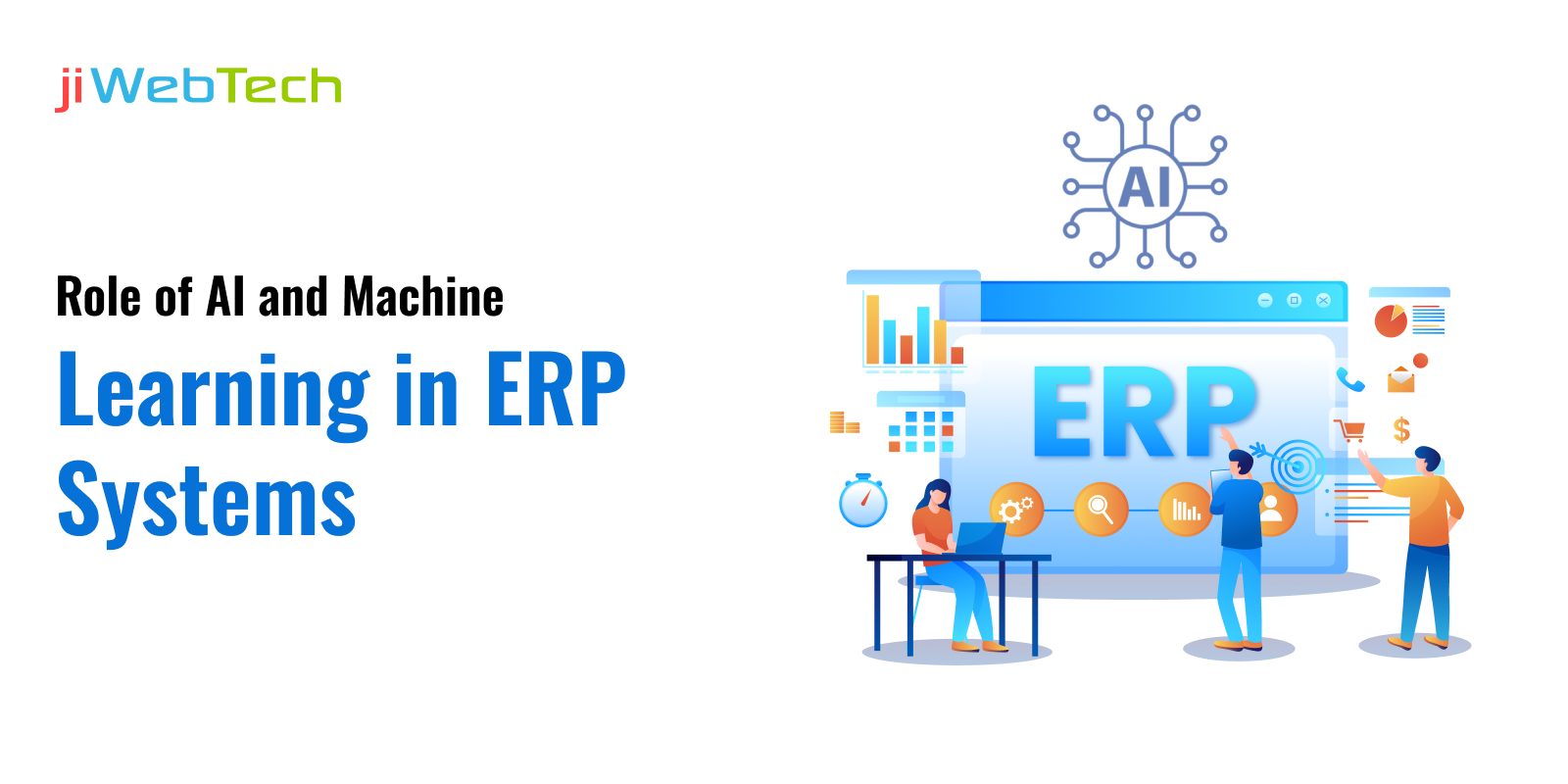- Sep 19, 2024
- Enterprise
- 3207
Share this post on:

In the realm of enterprise operations, the integration of Artificial Intelligence (AI) and Machine Learning (ML) into Enterprise Resource Planning (ERP) systems represents a revolutionary leap forward. These technologies are not just enhancing traditional ERP functionalities but also paving the way for more intelligent, efficient, and responsive organizational frameworks. This blog delves deep into the myriad benefits that AI and ML bring to ERP systems, exploring their transformative impact across various facets of modern businesses.
Understanding ERP Systems and Their Evolution
Enterprise Resource Planning (ERP) systems serve as the backbone of organizational processes, integrating core functions such as finance, human resources, supply chain management, and customer relationship management into a unified platform. Traditionally, ERPs have focused on data collection, storage, and transaction processing, facilitating smoother operations and improved decision-making.
However, the digital age demands more than just data management from ERP systems. Businesses today require real-time insights, predictive capabilities, and automation to stay competitive in a rapidly changing landscape. This is where AI and ML technologies step in, augmenting ERP systems with advanced analytics, automation capabilities, and intelligent decision support mechanisms.
The Benefits of AI and Machine Learning in ERP Systems
The integration of AI and ML into ERP solutions offers numerous benefits for businesses. Here are the following:
1. Enhanced Decision-Making and Predictive Analytics
AI and ML algorithms empower ERP systems to analyze vast volumes of data in real-time, extracting actionable insights and predicting future trends. This capability revolutionizes decision-making processes by providing executives and managers with data-driven recommendations and forecasts. For instance, predictive analytics can forecast customer demand patterns, optimize inventory levels, and improve supply chain efficiency.
2. Automation of Routine Tasks
Automation is a cornerstone benefit of AI and ML in ERP systems. These technologies can automate repetitive and rule-based tasks such as data entry, invoice processing, payroll management, and routine customer queries. By automating these processes, organizations not only reduce operational costs but also free up valuable human resources to focus on strategic initiatives that drive innovation and growth.
3. Operational Efficiency and Process Optimization
AI and ML enable ERP systems to optimize workflows and processes based on historical data and real-time information. This leads to streamlined operations, reduced lead times, improved resource allocation, and enhanced overall efficiency across departments. For example, AI-driven predictive maintenance can anticipate equipment failures in manufacturing, minimizing downtime and optimizing production schedules.
4. Personalized Customer Experiences
In the era of customer-centricity, AI-powered ERP systems play a crucial role in delivering personalized experiences. By analyzing customer data and behavior patterns, these systems can tailor marketing campaigns, recommend products/services, and optimize customer service interactions. Personalization not only enhances customer satisfaction but also fosters long-term loyalty and retention.
5. Risk Management and Fraud Detection
AI and ML algorithms bolster ERP systems with advanced risk management capabilities. These technologies can detect anomalies, identify patterns indicative of fraud or compliance breaches, and mitigate risks in real-time. By proactively monitoring transactions and activities, organizations can safeguard their assets, comply with regulatory requirements, and maintain trust with stakeholders.
6. Cost Savings and Resource Optimization
The automation and efficiency improvements facilitated by AI and ML translate into significant cost savings for organizations. Whether through reduced labor costs, optimized inventory management, or minimized operational inefficiencies, these savings contribute directly to the bottom line. Moreover, resource optimization ensures that businesses allocate their resources more effectively, maximizing productivity and profitability.
7. Scalability and Adaptability
AI and ML technologies empower ERP systems with scalability and adaptability, enabling organizations to evolve and grow in response to market dynamics. These systems can learn from new data inputs, adapt processes and workflows, and scale operations seamlessly as business needs change. Whether expanding into new markets or integrating acquisitions, AI-driven ERP systems provide the flexibility and agility needed for sustained growth.
8. Compliance and Regulatory Alignment
Ensuring compliance with industry regulations and standards is critical for businesses across sectors. AI-powered ERP systems enhance compliance efforts by monitoring transactions, flagging potential issues, and automating regulatory reporting processes. By maintaining compliance, organizations mitigate legal risks, avoid penalties, and uphold their reputation as responsible corporate entities.
Future Perspectives and Innovations
Looking ahead, the future of AI and ML in ERP systems holds immense promise for further innovation and transformation. Emerging technologies such as natural language processing (NLP), computer vision, and deep learning algorithms are poised to reshape ERP functionalities. These advancements will drive new capabilities in areas such as voice-enabled commands, automated quality inspections, and predictive maintenance, further enhancing operational efficiencies and business outcomes.
Practical Applications of AI and ML in ERP
Let us now move forward in the blog, and learn about the applications of AI and ML in ERP.
1. Demand Forecasting:
AI algorithms analyze historical sales data, market trends, and external factors to predict future demand accurately. This helps businesses optimize inventory levels, minimize stockouts, and reduce holding costs.
2. Supply Chain Optimization:
ML algorithms in ERP systems can optimize supply chain management by predicting supplier lead times, identifying transportation routes, and detecting potential disruptions. This ensures smooth operations and reduces logistics costs.
3. Quality Control and Predictive Maintenance:
In manufacturing environments, AI-powered ERP systems can monitor equipment performance in real-time, predict maintenance needs based on usage patterns, and minimize unplanned downtime. This proactive maintenance approach enhances productivity and extends equipment lifespan.
4. Customer Relationship Management (CRM):
AI enhances CRM capabilities within ERP systems by analyzing customer interactions, predicting buying behavior, and recommending personalized marketing strategies. This leads to improved customer satisfaction and loyalty.
5. Financial Forecasting and Risk Management:
ML algorithms analyze financial data within ERP systems to forecast revenue, detect fraud, and assess financial risks. This helps businesses make informed financial decisions and mitigate potential losses.
Conclusion
The integration of AI and Machine Learning into ERP systems represents a paradigm shift in how businesses leverage technology to achieve operational excellence and strategic growth. By harnessing the power of AI for decision-making, automation, predictive analytics, and personalized user experiences, organizations can streamline operations, reduce costs, and gain a competitive edge in today's dynamic market landscape.
As AI and ML continue to evolve, their role in ERP systems will likely expand, offering even more sophisticated capabilities such as natural language processing, image recognition, and cognitive automation. Businesses that embrace these technologies early stand to benefit the most, driving innovation and unlocking new opportunities for growth.
Looking for an ERP solution provider company? Look no further than jiWebTech. We offer the best online software solutions to businesses worldwide and help them grow. Contact us to learn more.









